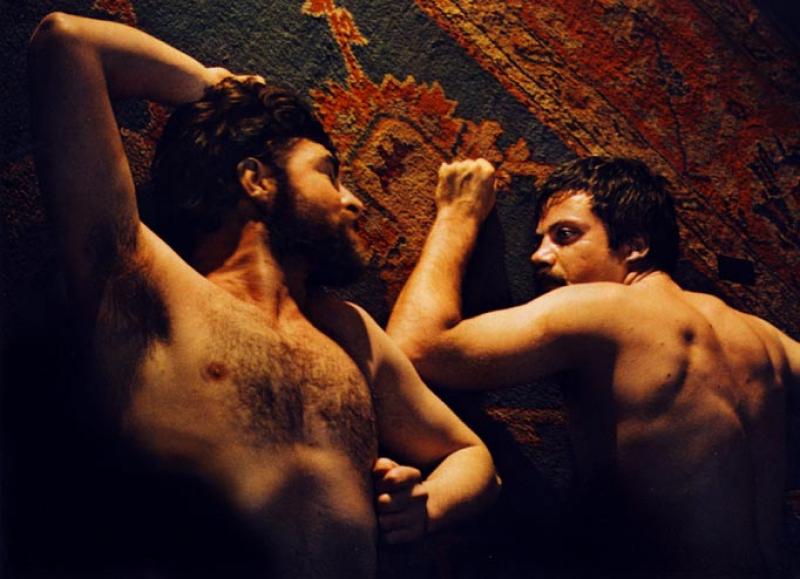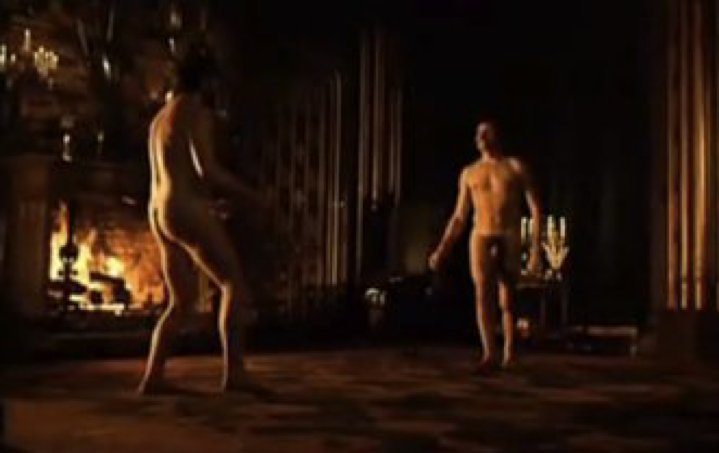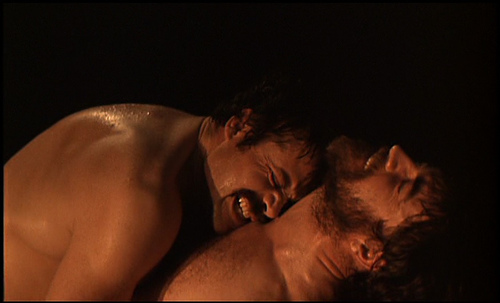theartsdesk Olympics: Graeco-Roman-Thespian wrestling | reviews, news & interviews
theartsdesk Olympics: Graeco-Roman-Thespian wrestling
theartsdesk Olympics: Graeco-Roman-Thespian wrestling
Ken Russell and DH Lawrence require two actors to undress and grapple in 1969

In the original Games featuring Athenians and Spartans and the like, they would of course have done it all in the buff. The sporting costume – the thin end of the wedge that is the singlet - was a tawdry Olympic neologism foisted on the pure ideals of the athletic contest in the first modern Olympiad in 1896. Just what naked wrestling would have looked like is of course something one has to imagine - dreamily or otherwise.
 The film itself, a hippy-trippy Sixties take on the Lawrentian quest for much more sex please, doesn’t really stack up these days (any more than its source, one might argue). It’s best remembered for the thoroughly homoerotic scene - the Men in Love interlude, if you will - in which Gerald Crich and Rupert Birkin flail about naked in the firelight. In the book the encounter happens when Birkin offers to demonstrate the jiu-jitsu techniques he once learnt in Heidelberg. In the film the sport isn’t given a name: Oliver Reed's Gerald just wants to hit something. “Well, you can’t do much in a stuffed shirt,” says Alan Bates as Birkin. “All right,” offers Reed/Gerald, “let’s strip, do it properly.”
The film itself, a hippy-trippy Sixties take on the Lawrentian quest for much more sex please, doesn’t really stack up these days (any more than its source, one might argue). It’s best remembered for the thoroughly homoerotic scene - the Men in Love interlude, if you will - in which Gerald Crich and Rupert Birkin flail about naked in the firelight. In the book the encounter happens when Birkin offers to demonstrate the jiu-jitsu techniques he once learnt in Heidelberg. In the film the sport isn’t given a name: Oliver Reed's Gerald just wants to hit something. “Well, you can’t do much in a stuffed shirt,” says Alan Bates as Birkin. “All right,” offers Reed/Gerald, “let’s strip, do it properly.”
The two actors, both in their early thirties, lock the door and then horns. Their freeform grapples, enhanced by the orange flow of the fire, look more or less like the muscular cavorting of figures on Grecian urns, with a heavy injection of actorly prancing. This is Graeco-Roman-thespian wrestling. They both get a gold medal for effort as their bits and pieces swing audaciously about in 1969.
 It may be deemed germane that I once interviewed the film’s scriptwriter and producer Larry Kramer, who was proud of the scene's fidelity to Lawrence's sinuous prose. When he and Ken Russell screened the film to Lord Trevelyan, the chief censor of the British Board of Film Classification, he recalled that “we were able to say, ‘This is a faithful representation.’ He caved in, much to our surprise.” I couldn't resist asking Kramer if, in preparation for the scene, the hard-partying he-man Reed toyed himself into a state of semi-tumescence. “Yes, he did,” said Kramer. “They didn’t get on very well. But you can’t see it on screen. Actually Alan had more natural endowment than Oliver.” Which may of course help to explain just why they didn't get on.
It may be deemed germane that I once interviewed the film’s scriptwriter and producer Larry Kramer, who was proud of the scene's fidelity to Lawrence's sinuous prose. When he and Ken Russell screened the film to Lord Trevelyan, the chief censor of the British Board of Film Classification, he recalled that “we were able to say, ‘This is a faithful representation.’ He caved in, much to our surprise.” I couldn't resist asking Kramer if, in preparation for the scene, the hard-partying he-man Reed toyed himself into a state of semi-tumescence. “Yes, he did,” said Kramer. “They didn’t get on very well. But you can’t see it on screen. Actually Alan had more natural endowment than Oliver.” Which may of course help to explain just why they didn't get on.
Explore topics
Share this article
The future of Arts Journalism
You can stop theartsdesk.com closing!
We urgently need financing to survive. Our fundraising drive has thus far raised £49,000 but we need to reach £100,000 or we will be forced to close. Please contribute here: https://gofund.me/c3f6033d
And if you can forward this information to anyone who might assist, we’d be grateful.

Subscribe to theartsdesk.com
Thank you for continuing to read our work on theartsdesk.com. For unlimited access to every article in its entirety, including our archive of more than 15,000 pieces, we're asking for £5 per month or £40 per year. We feel it's a very good deal, and hope you do too.
To take a subscription now simply click here.
And if you're looking for that extra gift for a friend or family member, why not treat them to a theartsdesk.com gift subscription?
more Film
 Can I get a Witness? review - time to die before you get old
Ann Marie Fleming directs Sandra Oh in dystopian fantasy that fails to ignite
Can I get a Witness? review - time to die before you get old
Ann Marie Fleming directs Sandra Oh in dystopian fantasy that fails to ignite
 Happyend review - the kids are never alright
In this futuristic blackboard jungle everything is a bit too manicured
Happyend review - the kids are never alright
In this futuristic blackboard jungle everything is a bit too manicured
 Robert Redford (1936-2025)
The star was more admired within the screen trade than by the critics
Robert Redford (1936-2025)
The star was more admired within the screen trade than by the critics
 Blu-ray: The Sons of Great Bear
DEFA's first 'Red Western': a revisionist take on colonial expansion
Blu-ray: The Sons of Great Bear
DEFA's first 'Red Western': a revisionist take on colonial expansion
 Spinal Tap II: The End Continues review - comedy rock band fails to revive past glories
Belated satirical sequel runs out of gas
Spinal Tap II: The End Continues review - comedy rock band fails to revive past glories
Belated satirical sequel runs out of gas
 Downton Abbey: The Grand Finale review - an attemptedly elegiac final chapter haunted by its past
Noel Coward is a welcome visitor to the insular world of the hit series
Downton Abbey: The Grand Finale review - an attemptedly elegiac final chapter haunted by its past
Noel Coward is a welcome visitor to the insular world of the hit series
 Islands review - sunshine noir serves an ace
Sam Riley is the holiday resort tennis pro in over his head
Islands review - sunshine noir serves an ace
Sam Riley is the holiday resort tennis pro in over his head
 theartsdesk Q&A: actor Sam Riley on playing a washed-up loner in the thriller 'Islands'
The actor discusses his love of self-destructive characters and the problem with fame
theartsdesk Q&A: actor Sam Riley on playing a washed-up loner in the thriller 'Islands'
The actor discusses his love of self-destructive characters and the problem with fame
 Honey Don’t! review - film noir in the bright sun
A Coen brother with a blood-simple gumshoe caper
Honey Don’t! review - film noir in the bright sun
A Coen brother with a blood-simple gumshoe caper
 The Courageous review - Ophélia Kolb excels as a single mother on the edge
Jasmin Gordon's directorial debut features strong performances but leaves too much unexplained
The Courageous review - Ophélia Kolb excels as a single mother on the edge
Jasmin Gordon's directorial debut features strong performances but leaves too much unexplained
 Blu-ray: The Graduate
Post #MeToo, can Mike Nichols' second feature still lay claim to Classic Film status?
Blu-ray: The Graduate
Post #MeToo, can Mike Nichols' second feature still lay claim to Classic Film status?

Add comment